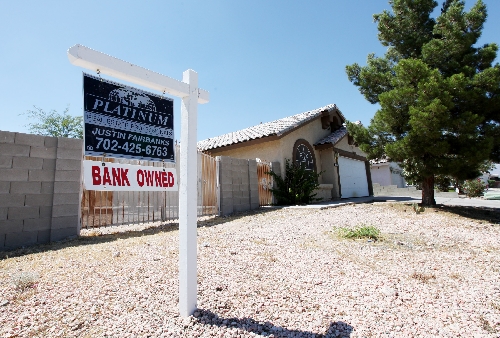Foreclosure filings in Nevada decreasing

Foreclosure filings are slowing in Nevada, and homes purchased at auction by third-party investors are being resold at a faster pace, an executive for California-based ForeclosureRadar.com said Wednesday.
Notices of default in Clark County decreased 12.9 percent in May, dropping to 3,539, the lowest number since August 2009, the online foreclosure listing firm reported. Notices of trustee sale were down 3.8 percent for the month, to 4,438.
It’s the second month of declining notice of default filings in Clark County, which is the first step in the foreclosure process, and the fourth consecutive month under 5,000. Whether that’s a short-term trend or an indication that the worst of the foreclosure crisis may have passed remains to be seen.
"The decrease in NODs appears at first glance to be a positive sign that the market is improving," ForeclosureRadar Chief Executive Officer Sean O’Toole said. "Unfortunately, the number of owners who are delinquent in their payments but not yet in foreclosure — the so called shadow inventory — tells us that the decline in foreclosures is largely artificial."
Still the trend has been headed down for some time and may continue, he said, as banks have no incentive to quickly work through the shadow inventory and will instead trickle it out over years.
The most consistent trend in the five Western states covered by ForeclosureRadar is a drop in how long it takes investors to sell properties purchased at auction, O’Toole said.
The average number of days between a foreclosure sale at auction and a third-party resale in Clark County was 101 days in May, compared with 120 days in April.
While that’s partly due to heightened sales activity in the spring, the slowing foreclosure process has left fewer affordable homes available for sale, O’Toole said. Banks take an average of 336 days to foreclose on a home in Clark County, down from last month’s peak of 348 days.
"Isn’t it amazing? We have 73 percent of Vegas homeowners underwater on their mortgage and thousands upon thousands not making a payment, and yet there are no homes available," O’Toole said. "It’s a very perverse situation that wouldn’t be possible without government intervention."
The only winners in this game may be foreclosure investors able to resell homes a little faster, he said. Investors play an important role in the housing market recovery because they’re more willing than banks to spend money fixing up a property.
While quicker turnaround time on foreclosure sales is encouraging, it’s too early to tell whether it’s a turning point from the otherwise recent downward trend in the housing market, O’Toole said.
Foreclosure cancellations dropped significantly in California, Nevada and Washington. In Clark County, banks canceled 1,931 sales in May, a 36.7 percent decrease from the prior month. There were 775 sales to third parties; 2,770 homes went back to the bank as real estate-owned.
After filing a notice of trustee sale, banks can cancel the sale for a number of reasons, including a loan modification or short sale, a filing error or legal requirement to file the notice again after extended postponements.
Banks are keeping homes on their books longer and blaming so-called "robosigners" and everything else when the reality is they can’t afford to take the losses, O’Toole said.
"They have a model that says Vegas will return and because they’re making all these (loan) modifications, they’re not going to have to sell," he said.
Banks aren’t maintaining the condition of homes in foreclosure as they did in the 1990s, when they actually made the loan and held the note, O’Toole said. Now they’re servicing the loan for a fee.
Hundreds of homes have been languishing on the market in Las Vegas for months — even years — to the detriment of neighborhood housing values, said Zolt Szorenyi, who works with banks in selling real estate-owned inventory.
"The reason Las Vegas home values keep dropping is directly tied to foreclosed properties that are being neglected by banks and left in bad condition for long periods, which are then consistently devalued by appraisers," Szorenyi said.
ForeclosureRadar reported average published bid — typically the balance due at original date of sale — of $287,000 in May, average opening bid of $166,000 and average winning bid of $169,000, up 4.8 percent from the previous month and down 7.4 percent from a year ago.
Contact reporter Hubble Smith at hsmith@reviewjournal.com or 702-383-0491.


















